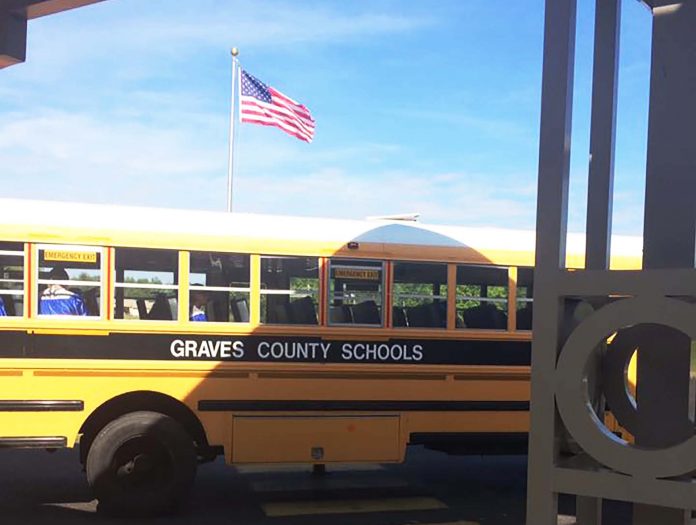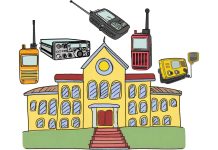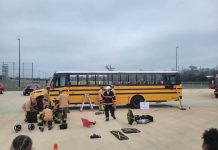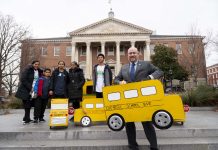One elementary school principal knows the life of a school bus driver all too well, as she obtained her commercial driver’s license to help with her school district’s field trip costs and the driver shortage. And now, amid COVID-19, Janet Throgmorton said school bus drivers are more important than ever.
Throgmorton, the principal at Fancy Farm Elementary in western Kentucky, has been an educator for the last 25 years. She started her career as a teacher at Fancy Farm and has been the principal for the past 11 years.
“I chose education because I loved kids,” Throgmorton told School Transportation News. “And I loved serving and working with kids and watching them learn and grow. And so that’s what inspired me to be a teacher. And then, you know, I wanted to be an administrator because I saw that you could affect a larger number of kids and ensure their quality of education, while also helping their family by giving [students] a nice environment for them to come to every day.”
The school building, however, isn’t the only place that Throgmorton is an educator. For the past three years, she’s been driving students to school when transportation was short-staffed, as well as taking students to athletic or field trips to cut down on associated costs.
Throgmorton said Graves County Schools currently provides four bus drivers to serve Fancy Farm Elementary students. But she explained the district started feeling the effects of the current bus driver shortage about five years ago. “It was difficult to get drivers for field trips and for several years when budgets were great, our district didn’t charge us transportation costs for a field trip because it was educational in nature,” she said. “But then we reached a point where we were going to have to pay for those things.”
To address budget costs and the lack of drivers, she volunteered to obtain her CDL and drive field trips as needed, as well as substitute drive for her elementary school. She said because Graves County Schools performs its own CDL training, learning how to drive ended up being convenient with her schedule. Though, she recalled, the written test was much more complicated than she anticipated.
“For the written test you’re studying and learning things about driving an 18-wheeler and hauling hazardous chemicals and those kinds of things,” Throgmorton explained. “Those were not things that I was familiar with at all and really was not prepared that I was going to need to know those things. It definitely took some studying.”
She said she benefitted from taking various practice tests and studying a manual the transportation director gave her.
Throgmorton added that because she grew up driving farm equipment, the driving part was easy. What took the most time was getting to know the engine parts and all the workings of the school bus. She added that she was fortunate to already know the district’s bus mechanics, who provided her with additional tips and techniques.
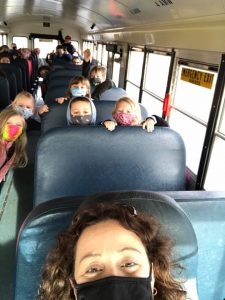
It’s been three years since she first obtained her CDL, but it’s been a blessing during the pandemic, as the district is even more short-handed, Throgmorton said. Right before the elementary school moved to non-traditional instruction, two of her school’s drivers, a husband and wife, tested positive for COVID-19. As of a week ago, the husband was still in the hospital on a ventilator and the wife was home on oxygen.
Losing half of her school’s drivers really put Fancy Farm Elementary in a bind. However, Throgmorton stepped up and has been driving daily afternoon routes since students have returned to in-person education.
“I tell my bus drivers all the time, their bus is just like a classroom in the school building, and I want them to run it that way,” Throgmorton said. “And they have an opportunity to teach kids on that bus just like we do in the classroom in the building. And I tell kids, ‘Your behavior should be exactly what it is when you sit in a classroom.’”
She added school bus drivers, in addition to being educators, are also the administration’s eyes and ears for what is happening with students at home. For example, Throgmorton said that bus drivers notice if parents’ cars are always home, potentially meaning they lost their jobs, or are never home. “I think it’s as important as any other job in the school system and I wish everyone saw it that way,” Throgmorton said. “Because it’s a difficult job.”
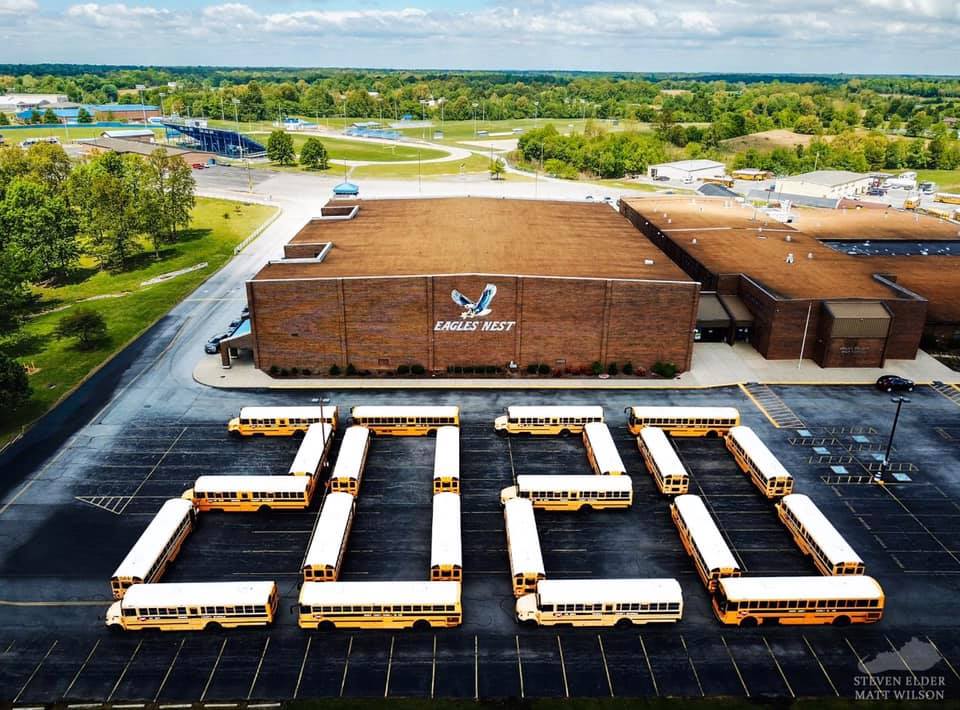
COVID-19 Effect on Fancy Farm
Being involved in education amid a global pandemic takes on a whole new meaning. “It’s a blessing because we can serve a lot of families [and] connect them with the resources they need during a difficult time,” Throgmorton said. “But it’s also very challenging. We’ve never taught school this way, where kids are in and out of school and you’re doing it through Zoom and trying to make sure everything works and trying to keep the learning moving. And so that’s been definitely a learning curve and very difficult, but you know everyone’s goal was that kids were safe and secure and still learning.”
She added that her surrounding community has really stepped up in meeting the mission of getting students back in school. She said local residents are providing cleaning supplies as well as wearing their masks, social distancing, and avoiding large crowds. Community virus contraction rates have remained low so students can return to learn in-person school.
Throgmorton explained her elementary school is one of seven in the district. Graves County Schools is actually one of Kentucky’s largest districts in terms of square miles, which she said puts a lot of stress on transportation operations, as buses are constantly running. At Fancy Farm Elementary, she’s responsible for 184 students in grades preschool through sixth.
Related: New Indiana and Kentucky Legislation Fights Illegal School Bus Passing
Related: Kentucky Legislation Calls for Mandatory School Bus Stop-Arm Cameras
Related: $1.9T Biden Stimulus Plan Would More Than Double K-12 Relief
Related: Latest K-12 Relief Funds Cover School Bus Ventilation Systems
Related: Paycheck Protection Program Reopens for Small Businesses
Fancy Farm went in-person instruction for the first 10 weeks of its first semester, then transitioned to non-traditional instruction on Nov. 18 until the Christmas Break. Throgmorton said the district started the new year back to in-person learning.
“Once we decided that we were going to try in-person school, it took a lot of work and planning, from having to remove the cloth or any kind of cloth furniture to removing furniture completely from classrooms so that you could position 6 feet apart. And finding enough sanitizing solutions and masks and gloves,” Throgmorton explained.
She said Graves County Schools decided to hire an aide to ride each school bus route in the morning, to take the temperature of students as they boarded and give them hand sanitizer. “So that [helped] cut down any transferring of germs on the bus because we weren’t going to be able to socially distance,” she said.
She added that families are also seated together, which required much pre-planning. Throgmorton added that the entire planning period lasted about a month. “A lot of work was put into getting that done and then trying to ensure that we had enough [staff],” Throgmorton said. “We had some dropouts, between bus drivers, teachers and aides, that didn’t feel comfortable coming back to school to work amid [COVID-19]. So just trying to ensure that we had enough of those people — It’s definitely changed the way you do business in every way.”
Going forward, Throgmorton advised other administrators to value their school bus drivers, as, without them, administrators wouldn’t have a job themselves. “If someone doesn’t get [students] here, I don’t have a job,” Throgmorton said. “Because not every parent can transport students to school and for lots of kids [school bus drivers are] the first smiling face they see in the morning and the last one they see. … I value drivers and want them to be on their best and do their best job because that’s what’s best for my kids.”


